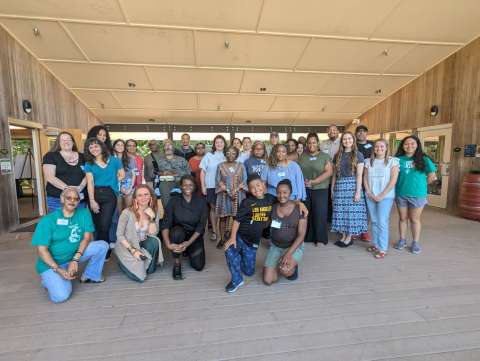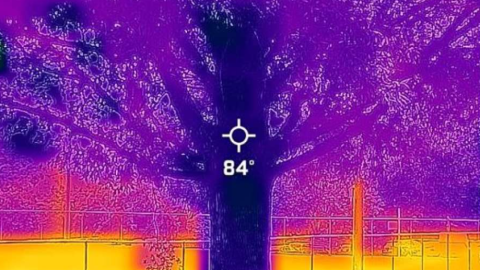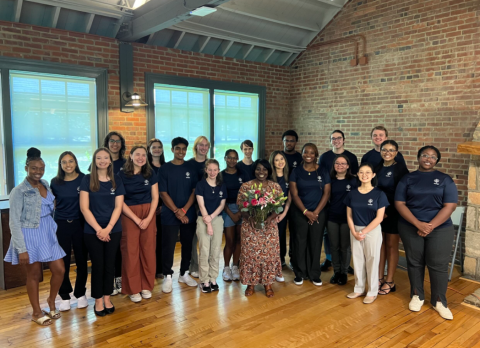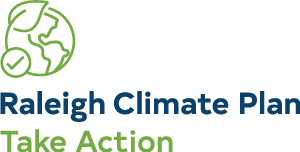The City of Raleigh is implementing several programs to build resilience and sustainably manage waste as part of the Community Climate Action Plan (CCAP). The cross-cutting strategies of climate equity, innovation, education and outreach, and funding for climate action are applied across climate action programs and involve several City departments and community partners. Learn more about Raleigh's many heat and flooding resilience programs.
Resilience to Climate Change
Resilience is the ability of a community to ‘bounce back’ from a stress or emergency and resume normal life as quickly as possible. This involves adequate preparedness for emergency events, ensuring that infrastructure, housing and other buildings are not exposed to hazards and built to withstand them. City staff have been creating community partnerships, gathering data, sharing information and working to strengthen resilience in our community. Top climate change threats in Raleigh include heat, flooding, and storms like hurricanes.
Raleigh was ranked as the second most climate-resilient city by Architectural Digest in 2023. In 2024, the Milken Institute also ranked Raleigh as the #2 Sustainable Growth and Resilient Large City.
Here are some major efforts aimed at improving the city’s resilience:
The City of Raleigh aims to build community resilience step by step with a three-year, $440,000 grant from the National Oceanic Atmospheric Administration (NOAA). This project focuses on the CCAP strategies, including equity, environmental justice, community resilience, funding, innovation, education, and outreach. Key partners include the nonprofit organization Partners for Environmental Justice (PEJ), the State of North Carolina’s Climate Office, and various local stakeholders.
- Activity 1: Walnut Creek Watershed Learning Network and Heat Island Learning Teams to empower the local community - Residents are paid for their time to attend trainings, hosted by Partners for Environmental Justice.
- Activity 2: Ready Raleigh Emergency Preparedness Guide to build resilience and prepare residents - The City of Raleigh created the Ready Raleigh Emergency Preparedness Guide as a tool for communities to prepare for emergencies.
- Activity 3: Resilience planning at the neighborhood level - The City of Raleigh convenes Raleigh residents at the neighborhood level to discuss their vision for a resilient city and their community priorities. The NOAA Climate Adaptation Partnership (CAP) at the NC State Climate Office is a key partner for this activity.

Flood Early Warning System
The Flood Early Warning System uses a network of creek elevation gauges, street sensors, flood cameras, and rainfall prediction networks to protect the public from dangerous flooding by identifying and predicting flood locations as early as possible. This allows first responders to mobilize faster to act and protect Raleigh residents appropriately. The Flood Early Warning system was recognized at national conferences in 2023 and was a Research Triangle Cleantech Cluster Cleantech Innovation Award finalist.
Heat Mapping
The City and several partners collaborated to map urban heat islands in Raleigh. The City is using the data to inform several climate equity projects including the Street Tree Equity Project, green stormwater infrastructure, and cool pavement technology. Learn more about the resilience work Raleigh is leading to help residents prepare for climate impacts and ways Raleigh is mitigating extreme heat.

Green Stormwater Infrastructure
An important strategy area of resilience in Raleigh is green stormwater infrastructure (GSI), which reduces the community’s exposure to flood hazards and helps to mitigate extreme heat in areas that most intensely experience these impacts. A new City of Raleigh Green Stormwater Infrastructure Policy became effective in November 2023. It requires evaluating City-led projects for GSI and promotes its installation to reduce stormwater runoff, improve water quality, and provide ecological benefits.
The Raleigh Rainwater Rewards program offers reimbursement of up to 90% of the cost for homeowners, businesses, non-profits, and community organizations to install green stormwater infrastructure (GSI), remove impervious surface or install rain cisterns and other GSI technologies. These projects have many environmental and aesthetic benefits. The Raleigh Rainwater Rewards Subsidy Program, funded by Raleigh City Council’s designation of American Rescue Plan Act (ARPA) funds in 2022, offers a 100% funding opportunity for projects in disproportionately impacted communities, making GSI more accessible in these communities.

Preservation and Green Space
CCAP supports open and natural space plans like tree planting, pollinator habitats, and parks acquisitions, which reduce urban heat islands, provide local food access, and increase physical and psychological resilience in our community. Trees create and define spaces; connect people to others and nature; and benefit the environment by consuming carbon, cooling the air, and collecting rainwater. The City’s Sustainability Office organizes efforts around pollinator habitat with partnerships across multiple departments and community organizations. See the 2024 CCAP Implementation Report to learn more about the City’s initiatives around preservation and green space.
Sustainable Waste Management
Waste and the processes of managing and moving the various streams of waste all produce greenhouse gas emissions. Although waste is only responsible for 1% of greenhouse gas emissions in Raleigh, CCAP includes strategies to address waste, including Raleigh Water’s Bioenergy Recovery Project that will turn wastewater into a biogas, which will be used to fuel a large portion of the transit bus fleet. Additional waste reduction strategies include increasing recycling, reducing waste production, and increased composting to reduce GHG emissions from our landfills. The City of Raleigh is partnering with The Great Raleigh Cleanup (TGRC) and A Place at the Table on a program, “The Workforce,” where people experiencing homelessness are paid for their participation in beautification projects around the community.
Learn more about sustainable waste management.
Implementation Strategies: Equity, Innovation, and Funding
The City integrates equity considerations in all its climate action initiatives. These programs often need to be innovative to address the needs of communities. City departments utilize varied funding sources including grants and the City budget. See a few highlights of programs centering equity, innovation, and use of funding opportunities below.
City Selected for Bloomberg Sustainable Cities Grant
Raleigh was one of 25 cities in the US awarded a Bloomberg Philanthropies grant focusing on climate change strategies that also address racial wealth.
Sustainable Business Toolkit
The Sustainable Business Toolkit is a collection of resources and support options for Raleigh businesses, nonprofits, and other organizations. Conveniently, the resources have been organized into different sectors that are important aspects of sustainability. There are options for building improvements, transportation, energy, water, waste and cost-saving methods, stormwater and water quality recognition, and community engagement.
Sustainable Neighborhood Toolkit
The Sustainable Neighborhood Toolkit is a collection of resources for neighborhoods and residents to become leaders in sustainable action in their communities. It includes options for people who just want to make individual improved choices and options for neighborhood leaders.
Championing Raleigh’s Environmental Stewards
Each year, the City’s Office of Sustainability partners with the Environmental Advisory Board (EAB) to host the Annual Environmental Awards, honoring individuals and organizations in Raleigh for their environmental efforts and climate action supporting the CCAP.
Raleigh’s Climate Action Fund is Funding Innovative Projects
The Climate Action Fund is a tool to help catalyze innovative pilot project ideas aimed at addressing the objectives in CCAP. This program provides small catalytic funding and guidance from staff leaders on how to implement the project with the CCAP objectives of equity, resilience and GHG mitigation as priorities. Recent and in-progress climate action projects include a Neighborhood Climate Action Fund, clean energy mural, anti-idling training, solar at Durant Nature Preserve, pollinator outreach materials, and expansion of the Raleigh Rainwater Rewards water quality program to provide 100% funding for eligible residents.
Community Climate Intern Program
The Partnership Raleigh Community Climate Intern Program welcomed its fourth cohort in June 2024, with 15 interns working across 9 City of Raleigh departments. This 10-week hybrid program offers paid internships to young adults in the Raleigh area, providing hands-on experience in various sustainability projects like green infrastructure, energy efficiency, and climate communications. Aimed at promoting climate action and preparing underrepresented groups for careers in sustainability, the program includes professional development workshops and networking events, which interns describe as transformative and valuable for their future careers in climate action.

See the 2024 CCAP Implementation Report for more details about community resilience, green infrastructure, waste, equity, funding, and innovation as part of climate action in Raleigh.
Project Highlight: Lake Lynn Trail West Loop
The Lake Lynn Trail West Loop is being designed with resilience in mind, incorporating the reuse of site facilities such as benches, trash cans, and signage to reduce waste. The project conserves natural green stormwater infrastructure (GSI) resources like trees, helping to mitigate heat and manage stormwater runoff. These sustainable practices will not only reduce environmental impact but also improve the trail’s ability to withstand flooding and support long-term community use.
